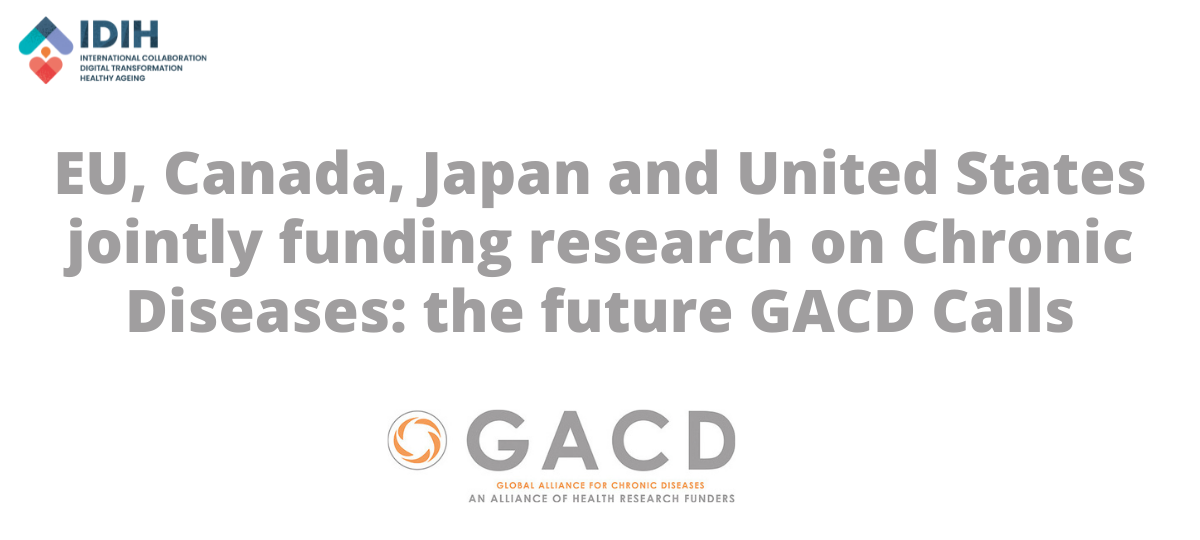To know more and request the assistance of the IDIH Helpdesk, email at: idih@apre.it
The Global Alliance for Chronic Diseases (GACD) is an alliance of international funding agencies that collectively provide over 80% of global public funding for health research, and the first collaboration of its kind to specifically address non-communicable diseases (NCDs). The GACD supports implementation science to improve health outcomes.
Besides the European Commission, the following funding organizations are Associate Members in GACD and enable participation of the respective R&I communities at national level in the GACD Calls:
- AMED, Agency for Medical Research and Development (Japan)
- National Institutes of Health (USA)
- CIHR, Canadian Institutes of Health Research (Canada)
GACD awards research grants in implementation science that focus on improving health equity in NCD prevention and management globally. By funding world-class research, the GACD aims to contribute to the evidence base that helps policymakers and practitioners make informed decisions on addressing NCDs in areas around the world where the need is greatest.
Current GACD Calls
- Seventh GACD call: Life course approach to NCD risk factor prevention and reduction – The seventh call for applications under the GACD banner focuses on implementation research to reduce the NCD burden by targeting critical life stages and key transitions between life stages.
 NCD prevention in adolescents, young adults and other vulnerable stages across the life course: implementation science focused on addressing common NCD risk factors through interventions that reduce health risk and/or enhance positive health and lifestyle behaviours in young people, and in other vulnerable life course stages (e.g., childhood, elderly).
NCD prevention in adolescents, young adults and other vulnerable stages across the life course: implementation science focused on addressing common NCD risk factors through interventions that reduce health risk and/or enhance positive health and lifestyle behaviours in young people, and in other vulnerable life course stages (e.g., childhood, elderly).
- Sixth GACD call: Cancer prevention (Please note that the National Institutes of Health is the only funding agency that continues to accept applications for the Cancer prevention call.)
Future GACD calls
The GACD will be offering new grants annually from 2021-2023. In particular, GACD has announced the intention to increase the frequency of its grant opportunities to tackle the growing burden of NCDs in low- and middle- income countries and among vulnerable populations (especially indigenous groups) in high-income countries.
In the future, funding calls will be announced annually each November, beginning in 2021. Whilst to date the GACD has funded disease-specific grants, the next three funding calls will target multimorbidity and common NCD risk factors, in alignment with its Strategic Plan. All calls will focus on implementation science.
Anticipations about 2022 GACD Calls:
Interventions in urban environments to reduce NCD risk: implementation science focused on individual and/or structural level interventions that can reduce NCD risk and/or maximise the health-promoting potential of cities. Transdisciplinary partnerships among health, urban planning and behavioural science experts are encouraged.
Anticipations about 2023 GACD Calls:
Integrated management of multimorbidity: implementation science focused on integrating interventions for optimising management and care for patients with multimorbidity.
All calls will enable the incorporation of digital innovation (e.g., AI, Big Data, telemedicine) into NCD implementation science.
The GACD is committed to supporting research undertaken through a genuine partnership among high and low/middle-income country academics, policymakers, local authorities, and community groups. Where possible, research questions should be driven by local stakeholders and other intended beneficiaries of the research project.
Whilst all GACD member funding agencies have agreed to the general scope and topic of the two calls, individual agencies will decide on a year-by-year basis whether or not they will participate in a call cycle and may adjust certain specific requirements of the call to fit their own research strategy. While every effort will be made to move forward with the call topics as described above, the GACD reserves the right to change one or more future call topics due to unforeseen circumstances.

